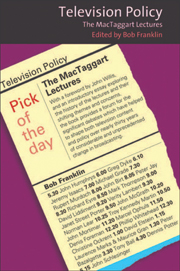Book contents
- Frontmatter
- Contents
- Acknowledgements
- Foreword
- Introduction
- The James MacTaggart Lectures
- Appendix A Edinburgh International Television Festival, 29 August–2 September 1977: Programme
- Appendix B Précis of Ted Turner, James MacTaggart Lecture 1982; Dr Jonathan Miller, James MacTaggart Lecture 1983
- Index
Foreword
Published online by Cambridge University Press: 05 August 2013
- Frontmatter
- Contents
- Acknowledgements
- Foreword
- Introduction
- The James MacTaggart Lectures
- Appendix A Edinburgh International Television Festival, 29 August–2 September 1977: Programme
- Appendix B Précis of Ted Turner, James MacTaggart Lecture 1982; Dr Jonathan Miller, James MacTaggart Lecture 1983
- Index
Summary
Just as T.S. Eliot's J. Alfred Prufrock laments ‘I have measured out my life with coffee spoons’, British broadcasters could equally have measured out their lives with MacTaggart Lectures. From the early explorations of naturalism by John McGrath and Marcel Ophuls to John Humphrys’ accusation that some programming has become ‘meretricious, seedy and cynical’, the MacTaggart Lectures have offered us a route map across the shifting sands of British broadcasting, a compelling insight into the preoccupations, passions and ambitions of television's leaders. Bob Franklin is to be congratulated for compiling this unique collection of the MacTaggart lectures which offer readers invaluable insights into the development of television policy across three decades.
At the end of August every year, hundreds and now thousands of television workers, from young students trying to break into the industry to media moguls, gather in Edinburgh to hear the MacTaggart. The atmosphere resembles the beginning of the school term where the pupils come to hear what one of the senior teachers has to say or perhaps to a hushed cathedral waiting for a major sermon from a senior archbishop. Indeed, for many years the lecture was actually held in a church so British television's great and good solemnly squeezed into rows of rock-hard pews to hear the McTaggart Lecture delivered as if from heaven. The current venue, the McEwan Hall at Edinburgh University, with its grand D-shaped hall and elegant semi-circular galleries, has the grandeur and scale of a cathedral even if it isn't one and was in fact built by a brewing philanthropist.
- Type
- Chapter
- Information
- Television PolicyThe MacTaggart Lectures, pp. ix - xiiPublisher: Edinburgh University PressPrint publication year: 2005



